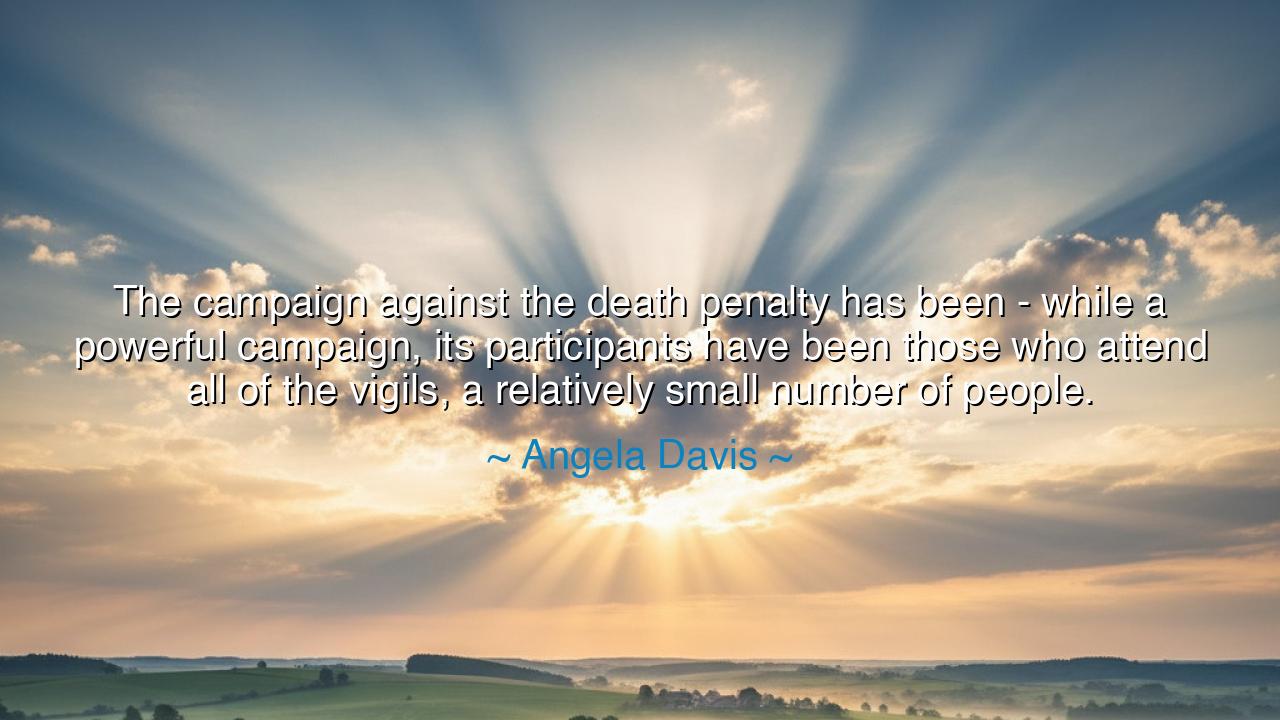
The campaign against the death penalty has been - while a
The campaign against the death penalty has been - while a powerful campaign, its participants have been those who attend all of the vigils, a relatively small number of people.






The revolutionary scholar and voice of justice, Angela Davis, once spoke with solemn truth when she said: “The campaign against the death penalty has been — while a powerful campaign, its participants have been those who attend all of the vigils, a relatively small number of people.” These words, measured and clear, are both a recognition and a lament. They remind us that while the struggle for justice and mercy burns brightly in the hearts of the few, the many often stand at a distance, silent in their comfort or indifference. Her reflection calls forth the eternal question that echoes through the corridors of history: Why do the masses remain still when the cause is righteous?
In these words lies not bitterness, but clarity — the wisdom of one who has spent her life at the crossroads of action and reflection. Angela Davis, who herself once faced imprisonment and the threat of death, speaks not as a bystander, but as one who has felt the machinery of the state press upon her very breath. Her statement unveils a painful truth: that movements for justice are often carried by a devoted few whose courage sustains the moral conscience of the world. The vigils she speaks of — those quiet gatherings of remembrance and protest — are sacred spaces where compassion takes visible form. Yet she mourns that the crowd does not swell; that society, though aware, does not awaken.
The death penalty, in her eyes, is not merely a punishment — it is a mirror of a nation’s soul. To kill in the name of justice is to entangle righteousness with vengeance. Davis, inheritor of the spirit of abolitionists past, stands among those who have long cried that no state has the right to take a life, no matter how grievous the crime. But she also sees that this moral struggle has not captured the full heart of the public. The people come to mourn when it is fashionable, they light candles when tragedy strikes, but too few stand steadfast when the flame of attention fades. Her words are not condemnation, but invitation — a call to expand the circle of compassion, to awaken those who have not yet felt the pain of another’s suffering as their own.
In history, such struggles have always begun with the few. Think of William Wilberforce, who fought for decades in the British Parliament to abolish the slave trade, facing mockery, defeat, and indifference. His movement began with a handful of voices, yet their persistence cracked the stone heart of empire. Or recall Socrates, who stood alone in Athens, defying the death sentence laid upon him for speaking truth — a death that, centuries later, still stirs the conscience of humankind. The vigils Davis speaks of are the modern heirs of those same fires: gatherings where the faithful refuse to let justice be forgotten, where the few become the seed of the many.
The origin of this quote lies in Davis’s lifelong fight against systems of punishment and inequality. From her years as a political prisoner to her decades as an educator and activist, she has seen that true change is rarely born in crowds; it begins in commitment, in the patient work of those who endure. When she says that the campaign against the death penalty consists of a “relatively small number of people,” she is not dismissing their effort — she is reminding us that every moral movement begins in solitude. The few who stand vigil today are the prophets of tomorrow’s awakening. They are the ones who keep the flame alive when the world looks away.
Her insight, however, is also a challenge to the rest of us. It asks: Where do you stand when the cries for justice are faint and unfashionable? The vigils are not only for the condemned, but for the conscience of society itself. When we fail to join them — when we remain silent in the face of injustice — we become complicit in the machinery that crushes the human spirit. Davis’s words call us to move from empathy to action, from sympathy to solidarity. To “attend the vigils” in the broader sense is to stand where pain is present, to speak for those whose voices are silenced, to make justice not an abstraction but a way of life.
The lesson, then, is clear: do not wait for the multitude to move before you act. The cause of compassion has always begun with the few, and it is the courage of the few that awakens the many. Whether the struggle is against the death penalty, against racism, or against any form of dehumanization, each person must decide to stand in the light, even when the world stands in shadow. Let us learn from Angela Davis’s lament and turn it into resolve. Let the vigils grow, not only in number, but in understanding. Let every act of mercy, however small, be a spark against the darkness of indifference.
Thus, Angela Davis’s words endure as both truth and summons: that even a small number of people can bear the weight of a just cause, but that the world must awaken if justice is to prevail. The death penalty is more than an instrument of law — it is a test of our humanity. And if only a few now stand against it, then we, too, must rise and join them, until the few become the many, and the many become the voice of conscience. For as long as one candle burns at the vigil, hope still lives — and in that light, even death itself can be overcome by the power of human compassion.






AAdministratorAdministrator
Welcome, honored guests. Please leave a comment, we will respond soon